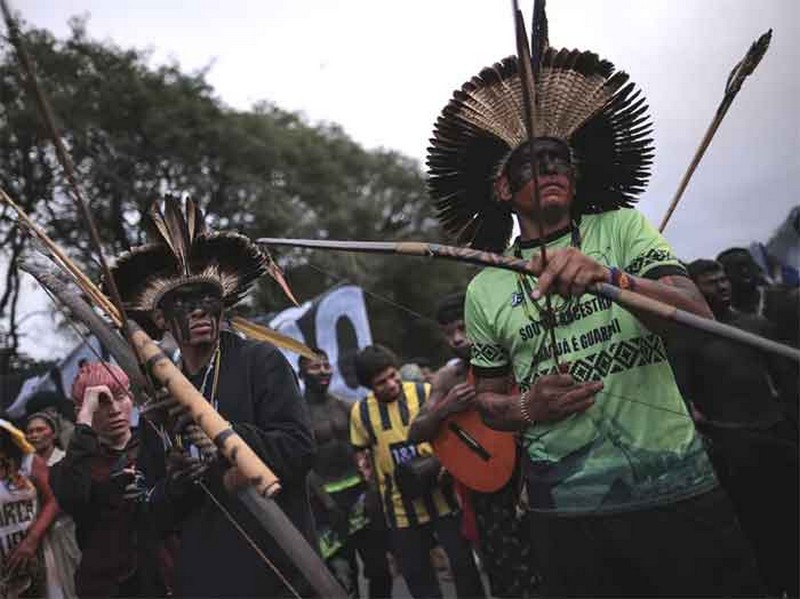By Harsh Thakor
Lawmakers in Brazil authorised a proposal that will unleash a mortal blow to Indigenous land rights and environmental protection.
On the 30th of May the National Congress of Brazil passed a new law draft, officially titled PL 490 or PL 2903, or the Marco Temporal. It would strip indigenous people of their claims to rights of their ancestral lands if they cannot prove that they were the actual inhabitants of the land before 5th of October 1988, when the current constitution of Brazil was chartered.. This is the most lethal privatization of land in the history of Brazil backing the vested interests of large landowners.
This change in titling rules will make the tribal communities vulnerable to land sharks who will find it easier to divert forest land for natural resource exploration and mining, experts said. This will threaten their lives and livelihoods.
On the aftermath of the imposition of the law in the congress, protests by various indigenous peoples were ignited in ten federal states of Brazil, propagating the central demand of land for the indigenous people.
Some truly heroic forms of resistance ignited in Pirituba, Xingu River and Paar highway. Illustrates their striking capacity to confront a powerful enemy. Remarkable the manner they combated the police onslaught with traditional weapons, like bows and arrows.
Background
There are 764 Indigenous territories prevailing in Brazil, but more than 300 have yet to be officially chalked and remain in legal domain. Most are situated in the Amazon and are considered insulation from deforestation.
President Luiz Inácio Lula da Silva identified six new territories back in April. He has promised to protect Indigenous rights and reverse years of rainforest destruction. Under the previous far-right administration of President Jair Bolsonaro, Indigenous land demarcation was initiated.
Lula had constructed a new Ministry of Indigenous Peoples. Its minister, Sonia Guajarara, called the new bill a “genocide against Indigenous peoples” as well as an “attack on the environment.”
The indigenous people were mercilessly displaced from their lands on innumerable occasions by large landowners and corporations, which made it an arduous task to prove their occupation of land. Indigenous organizations criticized the law for obliterating the history of the indigenous people before 1988, as well as paying a deaf ear the violence they experienced. The time span of 1988 is a pure legal document to justify the land robbing.
The Supreme Court of Brazil was assigned to give a ruling on the constitutionality of the law on the 7th of June, but the judge pleaded for more time to consider the issue, giving also the lawmakers’ greater time to induct the law before the ruling.
Protests (reports from A Nova Democracia)
In São Paulo the Guarani people obstructed the Bandeirantes highway, and faced the wrath of merciless repression from the military police, who suppressed the protest with water cannons, tear gas and pepper spray.
In the north-eastern federal states of Ceará, Bahia and Maranhão numerous highways were blocked for hours while in the northern Rondônia, Pará, Amazonas and Acre there were massive protests.
In Rondônia, the state’s main highway was besieged by protesters, who installed burning barricades comprising logs and tires.
In the south-western part of Pará, in the municipality of Bom Jesus, there was a protest lodged with burning barricades, and the highway BR-222 was besieged for over three hours. In the capital city of Pará, Belém, protests too, flared.
The Transamazônica Highway was blocked in Amazonas and in Acre; with banners against the new law distributed. In the Federal District indigenous peoples marched to the National Congress, fluttering banners protesting the law.
A ferry inlet of the Xingu river was blocked by Kayapó people. In Mato Grosso, Indigenous people obstructed the highway in Pará. Protest in Ceará.
On June 4th a large protest erupted in Pirituba, North Zone of São Paulo ,raising banners against the law and for land. The protesters at the fiercest scale protested the repression amidst a barrage of threats carried out by the military police against protesters at the blockade of the Bandeirantes highway. The decision of the Court of Justice of São Paulo ruling that further protests on the highway are prohibited and designating the military police to prevent any new attempts was vociferously condemned.
The military police manhandled the participants of the march. The law is now in the process of being be passed by the Senate and ultimately endorsed by President Lula. Lula and his government have been criticized by indigenous activists for pardoning such a law despite his promises of defending the welfare and rights of the indigenous people.
Harsh Thakor is a freelance journalist who has covered mass movements.
13 June 2023
Source: countercurrents.org

